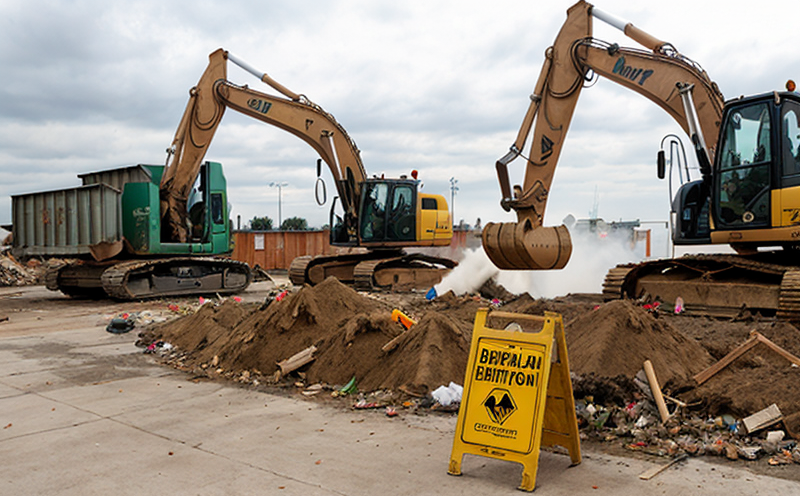EN 933-8 Fines Content in Recycled Concrete Aggregates
The European Standard EN 933-8 specifies a procedure for determining the fines content of recycled concrete aggregates (RCA). This method is crucial for ensuring that RCA meets the quality standards required for use in various civil engineering applications. The fines content, which refers to the proportion of particles smaller than a certain size, plays a significant role in the performance and durability of constructed structures.
The testing procedure outlined in EN 933-8 involves several steps that are essential for obtaining accurate results. Specimens are prepared by drying the RCA samples at specific temperatures to ensure consistency. The dried specimens are then sieved through a series of standardized sieves, with the fines being collected and quantified. This process allows for a precise measurement of the fines content, which is reported as a percentage.
Quality managers and compliance officers rely on this testing method to ensure that recycled concrete aggregates meet the necessary quality standards. By accurately measuring the fines content, they can verify that the RCA will perform reliably in various applications, such as road construction or structural repairs. This testing is particularly important for ensuring environmental sustainability by maximizing the use of recycled materials.
The results from EN 933-8 are used to inform decisions about the suitability of RCA for specific projects. Engineers and R&D professionals can utilize these data points to optimize the design and construction processes, thereby enhancing both the quality and cost-effectiveness of their projects. For procurement teams, this method provides a clear benchmark against which they can assess the quality of recycled materials.
The testing process is not only important for ensuring compliance with international standards but also for fostering innovation in sustainable construction practices. By adhering to EN 933-8, laboratories and testing facilities contribute to the broader goal of reducing waste and promoting recycling within the construction industry.
It's worth noting that while this method is widely recognized and accepted across Europe, it may also be relevant for projects in other regions that prioritize sustainable materials. This standard ensures a consistent approach to measuring fines content, which is essential for maintaining quality and reliability across diverse applications.
Industry Applications
| Application | Description |
|---|---|
| Recycled Concrete Aggregate (RCA) Testing | Determining the fines content of RCA for use in civil engineering projects. |
| Sustainable Construction Materials | Evaluating recycled materials to ensure they meet quality standards for construction. |
| Environmental Compliance | Verifying that the use of recycled concrete aggregates aligns with environmental regulations and sustainability goals. |
| R&D Innovation | Supporting research into new methods for recycling construction waste materials effectively. |
| Project Management | Providing data to inform project decisions and ensure compliance with quality standards. |
| Procurement Excellence | Ensuring the procurement of high-quality recycled concrete aggregates for construction projects. |
International Acceptance and Recognition
The EN 933-8 standard is widely recognized in Europe, where it plays a crucial role in the recycling of construction and demolition waste. Its acceptance extends beyond national boundaries, with many countries adopting it as a benchmark for quality control in their own industries.
Engineers and construction professionals around the world rely on this standard to ensure that recycled concrete aggregates are suitable for use in various applications. The international recognition of EN 933-8 underscores its importance in promoting sustainable practices within the construction industry. Laboratories and testing facilities that adhere to this standard can gain a competitive edge by ensuring their services meet or exceed global standards.
The widespread acceptance of this method also contributes to greater consistency in quality across projects, regardless of location. This consistency is vital for maintaining high standards of engineering excellence and ensuring the reliability of recycled materials used in construction.
By adhering to EN 933-8, laboratories and testing facilities can demonstrate their commitment to environmental sustainability and regulatory compliance. This standard provides a clear framework that helps ensure the quality and performance of recycled concrete aggregates, contributing to more sustainable and efficient construction practices globally.
Competitive Advantage and Market Impact
The ability to accurately measure fines content in recycled concrete aggregates using EN 933-8 provides laboratories with a significant competitive advantage. This method ensures that the testing results are reliable, consistent, and compliant with international standards. For quality managers and compliance officers, this translates into greater confidence in the quality of recycled materials used in projects.
By offering services based on EN 933-8, laboratories can differentiate themselves from competitors by providing high-quality, standardized testing results. This approach helps build trust with clients, particularly those who prioritize sustainability and regulatory compliance.
The market impact of adhering to this standard is substantial. It promotes the use of recycled materials in construction projects, thereby reducing waste and contributing to environmental sustainability. Laboratories that provide EN 933-8 testing services are positioned to benefit from growing demand for sustainable practices within the industry.
Furthermore, adherence to international standards like EN 933-8 can open up new markets and opportunities for collaboration with global clients. This standard ensures that laboratories meet the quality expectations of international clients, thereby expanding their reach and reputation in the global market.





